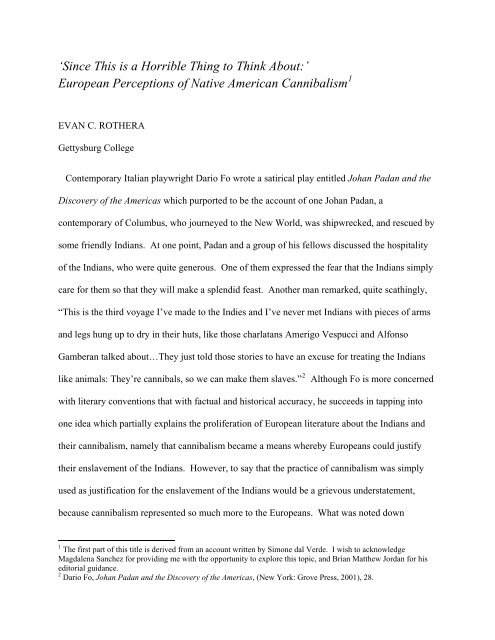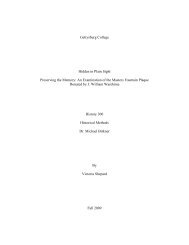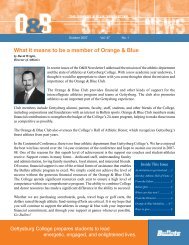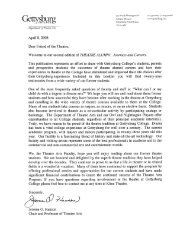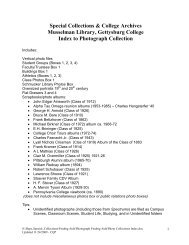Sweet Tooth for Empire: Sugar and the British Atlantic World
Sweet Tooth for Empire: Sugar and the British Atlantic World
Sweet Tooth for Empire: Sugar and the British Atlantic World
Create successful ePaper yourself
Turn your PDF publications into a flip-book with our unique Google optimized e-Paper software.
‘Since This is a Horrible Thing to Think About:’<br />
European Perceptions of Native American Cannibalism 1<br />
EVAN C. ROTHERA<br />
Gettysburg College<br />
Contemporary Italian playwright Dario Fo wrote a satirical play entitled Johan Padan <strong>and</strong> <strong>the</strong><br />
Discovery of <strong>the</strong> Americas which purported to be <strong>the</strong> account of one Johan Padan, a<br />
contemporary of Columbus, who journeyed to <strong>the</strong> New <strong>World</strong>, was shipwrecked, <strong>and</strong> rescued by<br />
some friendly Indians. At one point, Padan <strong>and</strong> a group of his fellows discussed <strong>the</strong> hospitality<br />
of <strong>the</strong> Indians, who were quite generous. One of <strong>the</strong>m expressed <strong>the</strong> fear that <strong>the</strong> Indians simply<br />
care <strong>for</strong> <strong>the</strong>m so that <strong>the</strong>y will make a splendid feast. Ano<strong>the</strong>r man remarked, quite scathingly,<br />
“This is <strong>the</strong> third voyage I’ve made to <strong>the</strong> Indies <strong>and</strong> I’ve never met Indians with pieces of arms<br />
<strong>and</strong> legs hung up to dry in <strong>the</strong>ir huts, like those charlatans Amerigo Vespucci <strong>and</strong> Alfonso<br />
Gamberan talked about…They just told those stories to have an excuse <strong>for</strong> treating <strong>the</strong> Indians<br />
like animals: They’re cannibals, so we can make <strong>the</strong>m slaves.” 2 Although Fo is more concerned<br />
with literary conventions that with factual <strong>and</strong> historical accuracy, he succeeds in tapping into<br />
one idea which partially explains <strong>the</strong> proliferation of European literature about <strong>the</strong> Indians <strong>and</strong><br />
<strong>the</strong>ir cannibalism, namely that cannibalism became a means whereby Europeans could justify<br />
<strong>the</strong>ir enslavement of <strong>the</strong> Indians. However, to say that <strong>the</strong> practice of cannibalism was simply<br />
used as justification <strong>for</strong> <strong>the</strong> enslavement of <strong>the</strong> Indians would be a grievous understatement,<br />
because cannibalism represented so much more to <strong>the</strong> Europeans. What was noted down<br />
1 The first part of this title is derived from an account written by Simone dal Verde. I wish to acknowledge<br />
Magdalena Sanchez <strong>for</strong> providing me with <strong>the</strong> opportunity to explore this topic, <strong>and</strong> Brian Mat<strong>the</strong>w Jordan <strong>for</strong> his<br />
editorial guidance.<br />
2 Dario Fo, Johan Padan <strong>and</strong> <strong>the</strong> Discovery of <strong>the</strong> Americas, (New York: Grove Press, 2001), 28.


